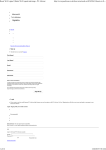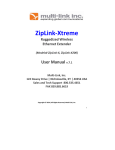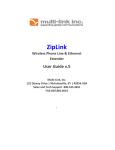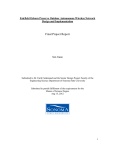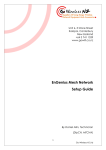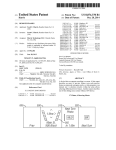Download Aperio - Troubleshooting Radio Related Problems - Ruko e-shop
Transcript
Title Aperio - Troubleshooting Radio Related Problems Category Type Aperio/Platform User guide Author Document number Revision Date Jörgen Frejd ST-001308 A 2012-06-25 Page (of) 1 (12) ASSA ABLOY Aperio - Troubleshooting Radio Related Problems ASSA ABLOY AB (Shared Technologies) Title Aperio - Troubleshooting Radio Related Problems Category Type Aperio/Platform User guide Author Document number Revision Date Jörgen Frejd ST-001308 A 2012-06-25 1 Page (of) 2 (12) Table of Contents 1 TABLE OF CONTENTS ..................................................................................... 2 2 REVISION HISTORY ...................................................................................... 3 3 INTRODUCTION ............................................................................................ 3 3.1 3.2 3.3 4 PURPOSE ..................................................................................................... 3 DEFINITIONS AND ABBREVIATIONS ....................................................................... 3 REFERENCES ................................................................................................. 3 APERIO ONLINE AND THE RADIO TEXT ......................................................... 4 4.1 THE APERIO RADIO TECHNICAL SPECIFICATION ........................................................ 4 4.2 HOW THE RADIO AND CHANNELS WORK IN APERIO ONLINE ........................................... 4 4.3 SYMPTOMS WHICH MAY BE RELATED RADIO DISTURBANCE ............................................ 4 4.3.1 LOCK GOES TO OVERRIDE LOOK UNEXPECTED ........................................ 4 4.3.2 THE LOCK INDICATES HUB BEING OFFLINE ............................................. 4 4.3.3 THE HUB INDICATES LOCK BEING OFFLINE ............................................. 5 4.3.4 THE PAP TOOL RADIO PERFORMANCE INDICATION ................................... 5 5 APERIO ONLINE USE CASES AND HOW TO TROUBLESHOOT .......................... 5 5.1 GENERAL ..................................................................................................... 5 5.2 SCENARIO 1 - COMMUNICATION BETWEEN APERIO HUB AND LOCK UNIT ........................... 5 5.3 SCENARIO 2 - COMMUNICATION BETWEEN PAP TOOL AND APERIO HUB AND LOCK UNIT ......... 5 5.4 TROUBLESHOOTING METHODS ............................................................................ 6 5.4.1 CHECKING THE CARDS THAT ARE LOGGED IN THE AUDIT TRAIL ................ 6 5.4.2 CHECKING SIGNAL STRENGTH FROM LOCK TO HUB USING THE PAP AND USB RADIO STICK............................................................................................ 6 5.4.3 CHECKING CHANNELS IN A WI-FI SURROUNDING .................................... 6 5.4.4 CHECKING THE 2.4 GHZ BAND FOR POSSIBLE CONFLICTING WI-FI ACTIVITIES USING THE INSSIDER APPLICATION ................................................. 7 5.4.5 CHECKING THE 2.4 GHZ BAND FOR POSSIBLE CONFLICTING DEVICES USING THE WI-SPY TOOL ............................................................................................ 8 5.4.6 CHECK THE STATUS OF THE HARDWARE ................................................. 9 5.4.7 VERIFY THE MECHANICAL INSTALLATION OF THE LOCK AND HUB .............. 9 5.4.8 WI-FI CHANNELS VERSUS IEEE 802.15.4 CHANNELS ...............................10 5.5 CHANGING THE RADIO CHANNELS USED BY THE APERIO SYSTEM ....................................11 ASSA ABLOY AB (Shared Technologies) Title Aperio - Troubleshooting Radio Related Problems Category Type Aperio/Platform User guide Author Document number Revision Date Jörgen Frejd ST-001308 A 2012-06-25 2 Page (of) 3 (12) Revision History Revision Date Changed by Description PA1 2012-05-09 Jörgen Frejd First draft of this manual PA2 2012-05-29 Jörgen Frejd Final text input PA3 2012-06-04 Jörgen Frejd Updated after 1st internal review A 2012-06-25 Jörgen Frejd Updated to rev A after internal review. 3 Introduction 3.1 Purpose This manual is intended to act as guidance for Aperio installers and support personnel when there are problems in an installation that may be related to radio disturbances or configuration of the Aperio radio. 3.2 Definitions and abbreviations Expression Description PAP tool Programming Application Hub Communication hub 3.3 References [1] ST-001323-Aperio Online Mechanical Installation Guide [2] ST-001321-Aperio Online Technology Reference Manual ASSA ABLOY AB (Shared Technologies) Title Aperio - Troubleshooting Radio Related Problems Category Type Aperio/Platform User guide Author Document number Revision Date Jörgen Frejd ST-001308 A 2012-06-25 4 Aperio Online and the Radio Text 4.1 The Aperio Radio Technical specification Page (of) 4 (12) The radio in the Aperio Online has the following specifications and functions: UHF communication on the 2.4 GHz band. Protocol based on the IEEE 802.15.4 UHF interface standard. All UHF communication is encrypted via AES 128 bit encryption. Is configurable to use any of the maximum 3 channels during operation. Channels can be chosen between 11 and 26 and 11 and 25 (US). 4.2 How the radio and channels work in Aperio Online In the Aperio system the Hub and the lock is normally configured to use 3 different channels. The default channels are 11, 16 and 26 and 11, 16, 25 in the US. These channels can be changed if needed to improve the radio performance. The channel that is actually used will change during normal operation if the Hub finds that the performance on the current channel is not good enough. If that happens, the Hub will initiate the channel change procedure with the lock. NOTE, it is only the Hub that will initiate a channel change. This means that any change to the channels using the PAP tool must be done simultaneously to the Hub and lock or first to the lock and then the Hub to ensure that the connection to the lock is not lost. 4.3 Symptoms which may be related radio disturbance The following section describes a few different symptoms which may indicate issues with the radio performance and the configuration that needs to be addressed. Note that depending on the underlying issue, the problem may come and go, typically within and outside office hours. Therefore, any actions taken to troubleshoot may need to be done at certain times or over a period of time if possible to catch the time when the problem occurs. 4.3.1 Lock goes to override look unexpected If the lock has problems communicating with the Hub on any of the configured channels, it will assume that the Hub is offline. In that case the credentials shown will be matched with the local override list in the lock. If this happens when not expected, i.e. when the Hub is known to be offline, this is an indication of poor communication between the lock and the Hub. 4.3.2 The lock indicates Hub being offline If a credential is shown to the lock and it finds the Hub to be offline, the LEDs on the lock will indicate this by 3 red blinks. If this happens when not expected, i.e. when the Hub is known to be offline, this may be an indication of poor communication between the lock and the Hub. ASSA ABLOY AB (Shared Technologies) Title Aperio - Troubleshooting Radio Related Problems Category Type Aperio/Platform User guide Author Document number Revision Date Jörgen Frejd ST-001308 A 2012-06-25 4.3.3 Page (of) 5 (12) The Hub indicates lock being offline The Hub will scan the locks at a configured interval. If it does not get a response within the specified status message interval, it will indicate that the lock is offline by one red blink at constant interval. If this happens when not expected, i.e. when the Hub or the lock is known to be offline, this may be an indication of poor communication between the lock and the Hub. 4.3.4 The PAP tool radio performance indication When the PAP tools has performed a scan, it will in the installation view show a colour coding on the measured signal strength between the USB radio and the Hub it communicates with. The colours are green for good signal strength, yellow for medium signal strength and red for poor signal strength. If the indication is red or yellow when standing close to the door, this may be an indication of poor communication between the lock and the Hub. 5 Aperio Online Use Cases and how to troubleshoot 5.1 General This section will describe different user scenarios and how to troubleshoot them to get around the suspected problem. 5.2 Scenario 1 - Communication between Aperio Hub and lock unit This is the most common use case where it is important that the installation works correctly to ensure that the lock is online with the Hub and EAC system at all times. As described in 4.3 there are a number of ways to detect that the radio link is not fully operational between the Aperio Hub and lock. Below are a few steps that can be taken to troubleshoot and resolve the problem. 5.3 Scenario 2 - Communication between PAP tool and Aperio Hub and lock unit The other use case apart from normal Hub to lock communication is when you use the PAP tool and the USB radio stick for configuration and maintenance operations. The most common scenario here is when you configure your Aperio installation the first time. Configuring a Aperio system does not normally require a lot of communication between the PAP/USB radio stick and the Hub and lock but it still needs to work properly to ensure a correct and efficient site setup. Another scenario is when maintenance is needed at an existing installation. This may entail re-configuring a device after device replacement, firmware upgrade to support a new required feature by the customer or a firmware upgrade due the need for a bug fix. ASSA ABLOY AB (Shared Technologies) Title Aperio - Troubleshooting Radio Related Problems Category Type Aperio/Platform User guide Author Document number Revision Date Jörgen Frejd ST-001308 A 2012-06-25 Page (of) 6 (12) As the PAP tool is used in this scenario, the initial step to run through in terms of troubleshooting is the one using the PAP to gauge the signal strength from the PAP and the USB radio stick and the Hub. This is detailed in section 5.4.2. As this scenario is the least common of the two, priority should be taken to ensure proper Hub and lock communication. However, steps can be taken to ensure a good maintenance environment as long as it does not have an adverse effect on normal lock operation. 5.4 Troubleshooting methods 5.4.1 Checking the cards that are logged in the audit trail Normally this is done already, but to ensure that any offline behaviour at the door is due to poor communication, please check that the credentials in the audit are actually configured at the EAC as access granted cards. If there are denied cards that are intended to be EAC granted, please change the EAC configuration. 5.4.2 Checking signal strength from lock to Hub using the PAP and USB radio stick There are today (as of the Aperio 2.6 release) limitations to how much the signal strength between the lock and the Hub can be measured. One way of doing this is to use the PAP tool and the USB radio stick. This can be done with the following steps. 1. Position a laptop with the PAP tool and USB radio stick as close to the door as possible. 2. Start the PAP tool and open the installation in question. 3. Locate the Hub in question and select show details. 4. Press F5 a number of times and note the colour of the UHF link indication in the installation view. If the colour is red, yellow or going in between red and yellow you may be having problems with the communication between the lock in the door and the Hub in its current configuration or position. As to addressing this problem run through the following steps in order. 1. Try different channels as described in 5.5. 2. Try a different set of hardware as is detailed in 5.4.6. 3. Check the installation part as described in 5.4.7. 5.4.3 Checking channels in a Wi-Fi surrounding As stated in 4.1, the Aperio system operates in the same radio band as the majority of Wi-Fi networks. If problems in radio performance are detected, Wi-Fi interference could be a cause of the problem. If your installation has a lot of Wi-Fi installed it is worth getting hold of the channel setup for those Wi-Fi networks. With that information it is possible to check if there are any obvious overlaps in channels between the Wi-Fi channels and the Aperio channels used on the common 2.4 GHz radio band. ASSA ABLOY AB (Shared Technologies) Title Aperio - Troubleshooting Radio Related Problems Category Type Aperio/Platform User guide Author Document number Revision Date Jörgen Frejd ST-001308 A 2012-06-25 Page (of) 7 (12) Note that the channels used are different between Wi-Fi and Aperio. Please refer to section 5.4.8 for details of those differences. 5.4.4 Checking the 2.4 GHz band for possible conflicting Wi-Fi activities using the inSSIDer application As stated in 4.1, the Aperio system operates in the same radio band as the majority of Wi-Fi networks. If problems in radio performance are detected, Wi-Fi interference could be a cause of the problem. If your installation has a lot of Wi-Fi installed, a suggestion is to use the inSSIDer application to scan for the channel setup and signal levels of those Wi-Fi networks. The insider application uses your laptops built-in Wireless network adapter to scan the surroundings. The application comes in a free version that can be downloaded at: http://www.metageek.net/support/downloads/. To use the application, download it and install it as per instructions. Then start the application. When it is up and running it will start a scan immediately. Click on the 2.4 GHz channels tab in the bottom view. It will present a graphical representation of the Wi-Fi networks that will look something like this: As the picture shows in this example, there are a number of different Wi-Fi networks in this particular surrounding. The signal strength varies in between them as shown with the blue markings. You can also see the channels used by those networks as shown with the red arrows. What is of interest now is to try to check channel overlap and possibly better channels to use. As you can see there are gaps in the overall 2.4 GHz band as shown with green arrows. This could be better choices for channels. As the channels numbering is different between Wi-Fi and IEEE 802.15.4 are different, please refer to section 5.4.8 for the translation. If a better set of channels is found, please refer to section 5.5 for instructions on how to change the channels in an Aperio system. ASSA ABLOY AB (Shared Technologies) Title Aperio - Troubleshooting Radio Related Problems Category Type Aperio/Platform User guide Author Document number Revision Date Jörgen Frejd ST-001308 A 2012-06-25 5.4.5 Page (of) 8 (12) Checking the 2.4 GHz band for possible conflicting devices using the Wi-Spy tool As stated in 4.1, the Aperio system operates in the same radio band as the majority of Wi-Fi networks. In addition to Wi-Fi, there may be other devices operating on the same band which may cause interference that could be a cause of the problem. If disturbances on the 2.4 GHz band could be a cause of the problem, a suggestion is to use the Wi-Spy tool and application to scan the 2.4 GHz band for other device in operation. The Wi-Spy tool comes with a dedicated 2.4 GHz USB radio dongle and an application. It is supplied by Crownhill Associates. There are a few different packages to use from but a usable package can be purchased for around 175 Euro. Please find you local retailer or purchase online at: http://www.metageek.net/products/wi-spy/ Compared to the free inSSIDer application, the Wi-Spy tool does not only target Wi-Fi networks but other devices as well. It also has the benefit that it can show the correct channel numbering. To use the application, install it as per instructions and start the application. When it is up and running it will start a scan immediately. Go to the ‘View’ Menu and select ‘Show Zigbee Channels’. This will show the channel numbering in the same way as the Aperio system uses them. It will present a few different graphical representation of the 2.4 GHz band that will look something like this: There are three different views. The top one shows a spectrum view of the band over time. The view in the middle shows the topographical view with the amplitude over the different channels accumulated over the entire measurement. This is good view to show which channels that are either highly used which is shown with a more intense yellow-to- ASSA ABLOY AB (Shared Technologies) Title Aperio - Troubleshooting Radio Related Problems Category Type Aperio/Platform User guide Author Document number Revision Date Jörgen Frejd ST-001308 A 2012-06-25 Page (of) 9 (12) red colour as shown with the red markings. It also shows the max amplitude across the band as shown in the blue markings. The bottom graph shows the runtime samples as well as the maximum and average amplitude levels. This view can be useful in respect to the average view where the low amplitude channels can be found to be more suitable for channel selection as opposed to others. As the channels numbering is different between Wi-Fi and IEEE 802.15.4 are different, please refer to section 5.4.8 for the translation. If a better set of channels is found, please refer to section 5.5 for instructions on how to change the channels in an Aperio system. 5.4.6 Check the status of the hardware If you detect poor radio performance there is the off chance the hardware is damaged, thus causing the poor radio performance. To check if that is the case, try to replace the Hub and lock in two different steps to see if the situation improves. If you do this, ensure that you note the current settings of channels, security mode etc. in the existing setup so that can be re-configured in the replaced units. Please refer to the Aperio Online Reference Manual, ref [2] for details on re-configuring your devices. If replacing the existing devices does not help, check the mechanical installation as described in ref [2]. This should tell you if you current installation is as per recommendation but also if a different Hub or Hub accessory can be used to improve the situation. 5.4.7 Verify the mechanical installation of the lock and Hub If a radio disturbance problem is detected, the mechanical installation of the Hub lock combination can both be the root of the problem but also the way forward in resolving such a problem. The Aperio Online – Mechanical installation guide ref [1] details all aspects of Hub and lock placement such as distances between Hub and lock, the placement of the Hub in context of the lock position, type of Hub use and the effects of a Hub accessory such as an external antenna. By reviewing this guide based on the installation question, you may see that the Hub is not in a good position, either in terms of angle, position or distance. You may also see that depending on the options at hand, changing to a different Hub might resolve the problem. ASSA ABLOY AB (Shared Technologies) Title Aperio - Troubleshooting Radio Related Problems Category Type Aperio/Platform User guide Author Document number Revision Date Jörgen Frejd ST-001308 A 2012-06-25 5.4.8 Page (of) 10 (12) Wi-Fi channels versus IEEE 802.15.4 channels As mentioned in previous sections, the channel numbering in Wi-Fi is different from the IEEE 802.15.4 channels. Below is an illustration on those differences and how the different channels by number matches up. ASSA ABLOY AB (Shared Technologies) Title Aperio - Troubleshooting Radio Related Problems Category Type Aperio/Platform User guide Author Document number Revision Date Jörgen Frejd ST-001308 A 2012-06-25 5.5 Page (of) 11 (12) Changing the radio channels used by the Aperio system The most common solution to any problem related to radio performance is to change the channels of the Aperio system. There are some aspects of channel change that you should be aware off when a channel change is performed. As mentioned before it is the Aperio Hub that decides on which channel of the three that will be used. This means that if the channel needs to be changed, the channels must be either changed at the same time by using ‘Configure’ in the PAP as shown here. If the change is not done via the Configure option you must change the address of the lock first by using ‘Lock->Change radio channel’ as shown here: ASSA ABLOY AB (Shared Technologies) Title Aperio - Troubleshooting Radio Related Problems Category Type Aperio/Platform User guide Author Document number Revision Date Jörgen Frejd ST-001308 A 2012-06-25 Page (of) 12 (12) Then as the last step you will need to change the channels for the Hub as shown here: The reason for this order is that all communication during configuration via the PAP goes through the Aperio Hub. This means that the channels of the lock must be changed while the lock and Hub are on the same channels. The Hub can always be reached from the PAP tool and the USB radio stick. ASSA ABLOY AB (Shared Technologies)












